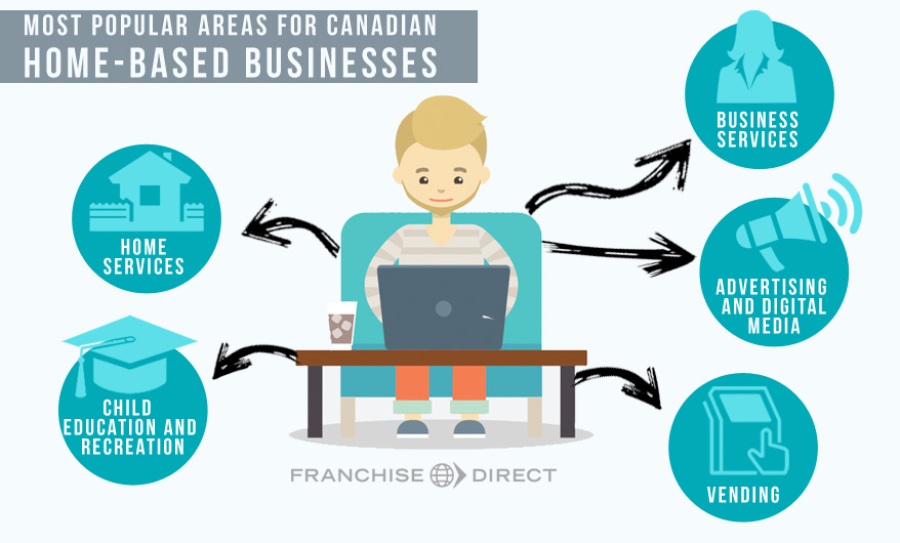🕒 Estimated Reading Time: ~9 minutes

Working from home was becoming more popular for both big corporations and for small businesses across Canada—even before the pandemic. As so many people have experienced, home-based companies can be just as successful as their office-based counterparts. And franchises in Canada are doing their part to stay ahead of this workplace trend.
Why Start a Home-Based Franchise?
The ability to work from home is appealing to a lot of Canadians, and home-based franchises offer plenty of advantages:
Lower Investment Costs
One of the primary reasons investors chose home-based franchise opportunities is because of the lower investment costs. Most small business owners start with less than $10,000. Home-based franchise opportunities have a lower financial investment because they don’t require expenses for things like rent, construction, or other basic office costs such as utility bills.
Flexible Schedule
There never seems to be enough hours in the day, and finding time to schedule all the things you want to do can be a challenge. This challenge is particularly felt by parents who want to be able to work as well as pick their kids up from school and take them to after school activities. With a home-based franchise, owners can have more control over the times that they work, scheduling around family and personal time.
Improved Productivity
For many people, working from home means improved productivity. A two-year Stanford study found a 13% performance increase in employees who worked from home that involved working more minutes per shift and a more comfortable work environment.
Other factors of a home-based franchise, such as less time needed to open for business and no time spent commuting, lead to owners spending more time working on a business they’re passionate about and enjoy.
The Most Popular Home-Based Franchises
Nearly every industry has businesses with a work-from-home option. With such a variety of franchise opportunities available in the home-based sector, there is sure to be one that aligns with your interests.
Here are some of the most popular areas for Canadian home-based businesses:

- Home Services: Home service franchises include cleaning, maintenance, decorating, remodeling, landscaping, lawn care franchises and more. Many home service franchises have the potential of being mobile-based, creating a need for vehicle storage space.
- Business Services: Business service franchises help other companies, particularly small and medium sized businesses, with tasks like accounting and financial services, business coaching and consulting, and administrative and personal assisting. These businesses are great for being home-based because the tasks often require only a computer and software.
- Child Education and Recreation: Franchise owners in child-related fields often travel to homes, schools, camps, and other community centers to provide educational services. Child party and recreation franchises tend to travel to homes and party sights and set up any equipment there the day of.
- Advertising and Digital Media: Advertising and digital media fall under the broader category of business services, but it is important to single them out as a new wave of digital media advertising specialists have made their careers solely online working remotely. This is a unique franchise industry that is ripe for the next generation of franchisees to take advantage of.
- Vending: Once vending machines are put in place, the business almost runs itself, making this a popular home-based industry. All that is required of vending franchisees is regular checking and restocking of the machines.
Is Starting a Home-Based Franchise Right for You?
Working from home may not be the right move for every business owner. Some people find working from home to be more productive, while others thrive in an office setting. Before starting a home-based franchise, ask yourself the following questions:
- Is starting a home-based business right for you personally as well as your family?
- Will you be able to set boundaries between your home office and the rest of your home? How will you deal with potential interruptions from family and friends?
- Are you self-motivated enough to work on your own? Do you work well without a supervisor?
- Are you good at time management?
Self-discipline can be one of the toughest part to manage in a home-based business. Without a manager or supervisor to report to, franchisees will need to be disciplined enough to maintain the profitability of their business, even when business is slow or quiet.
Home-Based Business Licenses and Fees
Each municipality has its own rules and regulations for home-based business licenses, fees and insurance. The total amount of fees paid will depend on the type of license you need to operate your franchise. Potential franchisees should look into the regulations of their city and province regarding home-based offices, including how it may affect their taxes and home insurance, before making any commitments.
Home-based business fees have long been a source of conversation and wrangling in Canada. For example, a 2018 report showed that in Edmonton, fees for running a home-based business were higher than anywhere else in Canada. At that time, to open a home-based business in Edmonton, the fees were up to $235 for a license, plus $53 for the home being of commercial use and $125 for a development permit. The fees combined were nearly double what Toronto or Vancouver charges.
In response, the Edmonton council voted to cut fees for “minor-home businesses.” Starting in 2019, city officials eliminated the $125 development permit requirement, leaving the $235 annual business license and $53 home-based business fee in place, offering some relief to home-based business owners.
Something else to consider is the license granted not only will make your business legal, it will also come with rules for how your business can be run. For instance, the city of Vancouver’s home-based business license requirements stipulate that no clients are permitted on the home-based premises, no partners or employees are permitted to engage in running the business from the residency, no more than three home-based business licenses can be issued for one home, and more.

Beyond fees and regulations, look into how your home-based franchise could affect your home insurance. Home insurance covers the home, and using the home for business purposes could void your insurance. Franchisees should talk to their insurance agency to make them aware of a new home-based business and should look into their options for other necessary kinds of insurance, including business property insurance, business vehicle coverage, professional liability insurance, and errors and omissions insurance.
On the subject of taxes, your new home-office may also qualify as a tax-deductible space. Investors can seek professional tax advice to determine if they can write off rent or property tax, utilities, insurance, or maintenance. Read a summary of the Government of Canada’s “Business-use-of-home expenses” here.
4 Tips for Home-Based Franchising Success
Making the change from working in an office to working from home can be a jarring jump. Here are a few tips to help you overcome the challenges and run a successful home-based business:
- Set up a space in your home that is solely an “office” space. Don’t use this space for anything other than work-related projects to better form the boundaries between “work” and “home.”
- Create a set schedule. This way you can maintain a steady routine during the hours that are most productive for you. A regular schedule will also help keep you accountable for getting your work done and on time.
- Dress for work. You don’t have to get dressed up like you’re going into a corporate office, unless you want to, but changing out of your pajamas can help you make the shift from “home” to “work” and will make it easier to get your work done.
- Get out of the house every once in a while. Even when working from home, you’ll still need to take a break every now and then. Especially if your home-based job doesn’t involve regularly communicating with others, it is a good idea to get out of the house, run some errands, and be around other people.
Opening a Home-Based Franchise
When you’ve selected an opportunity you’re interested in and you’re ready to take the plunge into home-based franchising, it's time to take a close look at all of the provisions and fees related to the investment.
The Initial Investment and Opening Costs
The investment for a home-based franchise is typically lower than that of other franchises simply because of the lack of real estate costs. But there are still other expenses to consider, and investment ranges will vary depending on the unique franchise system. For home-based franchise opportunities, you’ll need to consider factors such as:
- Business permit costs
- Vehicle expenses (if applicable)
- Necessary software, tools, and equipment
- Costs associated with converting a home space into a work space
- Advertising and marketing expenses
In six provinces, franchisors are required to provide a Franchise Disclosure Document (FDD) to the prospective franchisee that contains detailed information on all systems, procedures and costs associated with that franchise. These provinces are Alberta, British Columbia, Manitoba, New Brunswick, Ontario, and Prince Edward Island. By law, the FDD must be presented to the prospective franchisee before a prospective franchisee pays any money or enters into an agreement relating to the franchise.
Prospective franchisees should review the FDD for all provisions and fees associated with investing in a particular franchise with a business advisor and/or legal counsel, taking into consideration their unique circumstances, before making the decision to enter into a franchise agreement.
Ongoing Costs
Don’t forget about the additional costs required for nearly all franchise businesses. This includes expenses such as royalty fees, marketing fees, software fees, training fees, and more.
For home-based franchises, in particular, franchisees may experience an increase in their home utility costs.
It’s important to note that while many initial and ongoing costs are detailed in the FDD, there are some costs inherent to business ownership, like employee wages or utility costs, that aren’t.
Bottom Line
Making the career change to running a home-based franchise business can seem like a daunting task. But if you have the drive and the diligence to be your own boss and maintain a productive home working environment, you can succeed with a home-based franchise. The internet has made working from home an option for thousands of people, and there is a nearly endless supply of businesses that can be run from the comfort of your own home.
Every year, more Canadians are electing to work from home and are finding success doing so. The home-based business trend is just getting started, and the industry shows no sign of slowing down.
To find the home-based business that is right for you, please browse the listings on our home-based franchise opportunities page.
Hottest Home-Based Franchises

Blam Partners
Run your own business providing mobile apps & responsive websites to small businesses.

Best.Energy
Fight climate change. Build your business. Profit with support. Best.Energy is seeking new partners!

ActionCOACH Canada
Love to help other business owners thrive? Consider investing in one of the fastest growing sectors in Canada: Business Coaching.














